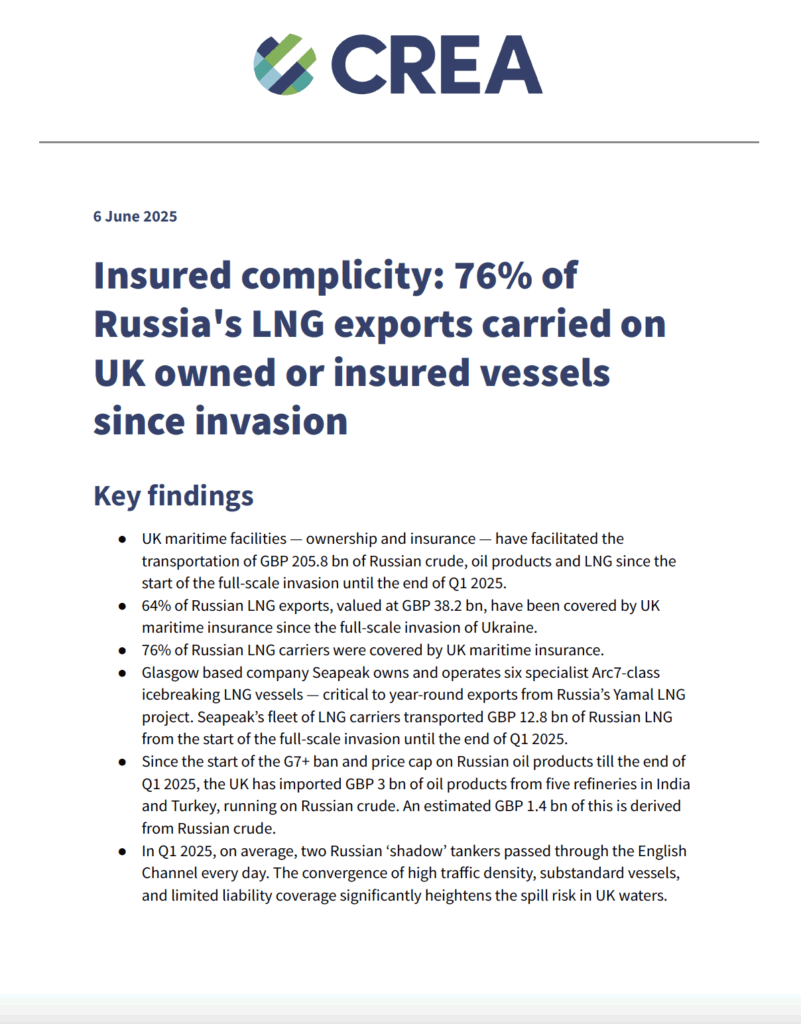The United Kingdom has emerged as one of Ukraine’s most steadfast allies since the start of Russia’s full-scale invasion of Ukraine in February 2022, delivering substantial military, humanitarian, and economic support. Until February 2025, the UK had committed GBP 12.8 bn in aid to Ukraine — the third highest of all donor countries.
Prior to the full-scale invasion of Ukraine, Russian energy was a significant part of the UK’s energy imports. They totalled an estimated GBP 4.8 bn in 2021. These imports consisted mainly of refined oil products (58% of the total imports from Russia), and also included crude oil (20%), LNG (19%), coal (2%) and pipeline gas (1%). In 2021, the year prior to the invasion, 24% of the UK’s seaborne imports of refined oil products came from Russia.
To address the UK’s reliance on Russian fossil fuels and support Ukraine, the UK took decisive action to reduce its economic ties with Russia in the energy sector following the full-scale invasion. A ban on imports of Russian coal came into force in August 2022, and was followed by a ban on crude and oil products (5 December 2022). Russian liquefied natural gas (LNG) imports were banned in the UK from 1 January 2023. These measures aimed to weaken Russia’s ability to finance its war machine while accelerating the UK’s transition to cleaner energy and diversifying away from volatile Russian energy supplies. The UK was also a key player in developing the Russian oil price cap policy with allies — a measure aimed at reducing the Kremlin’s main revenue stream by setting a maximum price for Russian oil transported using Western-owned, insured, or connected tankers. These sanctions have impacted Russia’s fossil fuel export revenues, lowering them over time.
Yet, since the start of the ban and price cap on Russian oil products till the end of Q1 2025, the UK has imported GBP 3 bn of oil products from five refineries in India and Turkey running on Russian crude. CREA estimates that GBP 1.4 bn of these imports were derived from Russian crude. The UK’s imports of oil products from these refineries has generated GBP 510 mn in tax revenue for the Kremlin. Since the bans, these five refineries have used an estimated GBP 1.2 bn of Russian crude to create these products for export to the UK.
These five refineries are the Jamnagar refinery (India), Vadinar refinery (India), New Mangalore refinery (India), STAR refinery (Turkey) and Tupras Aliaga (Turkey). An overwhelming majority of these refineries’ exports to the UK (80% of the total, valued at GBP 2.4 bn) consist of jet fuel. In addition to jet fuel, the Jamnagar refinery is the only one sending other products (diesel and gasoil) to the UK.
At the same time, it is important to note that the volume of this trade is relatively low, and therefore not a threat to the UK’s energy security. A mere 6% of the UK’s imports of oil products since the full-scale invasion has come from these five refineries. CREA’s analysis has also found that for UK importers, jet fuel imported from these Indian refineries in 2023 was a mere 2% cheaper than that from other sources.
UK owned tankers have also been involved in the transport of Russian oil, helping ship GBP 1.8 bn since the invasion to the end of Q1 2025. It is important to note though that UK owned vessels transported a mere 0.4% of Russia’s total oil exports in this period.
UK Protection & Indemnity (P&I) insurance’s role however is far more incriminating. They have insured a third of Russia’s total seaborne exports since the start of the invasion till the end of Q1 2025. In this period, they have been the largest maritime insurer of Russian oil, covering GBP 159.3 bn of Moscow’s crude and oil products.
CREA’s analysis also revealed that UK owned or insured LNG carriers facilitated the transportation of GBP 45 bn of Russian LNG from the start of the full-scale invasion until the end of Q1 2025. This means that 76% of the total export value of Russian LNG was carried on UK owned or insured vessels.
When looked at in conjunction, vessels owned or insured in the UK have facilitated the maritime transportation of GBP 160.7 bn of Russian oil since the start of the full-scale invasion of Ukraine. CREA’s analysis estimates that UK maritime services have facilitated the transportation of GBP 205.8 bn of Russian crude, oil products and LNG since the start of the invasion until the end of Q1 2025 — more than double the Kremlin’s annual military spending of GBP 97 bn in 2024.
The UK must actively strengthen energy sanctions on Russia to hurt their revenues and contract funding for their invasion of Ukraine.
CREA recommends a complete ban on UK maritime services for the transport of Russian LNG. A ban on UK insurance that covers LNG carriers will inhibit their access to ports of delivery in the EU and curb deliveries from Yamal.
The UK must also tackle the legal refining loophole. The UK’s imports of oil products from five refineries using Russian crude have generated GBP 510 mn in tax revenue for the Kremlin.
Find all policy recommendations in the briefing.
| Methodology The data used in this analysis is based on CREA’s Russia Fossil Shipment Tracker methodology. Our methodology detailing G7+ countries’ imports of oil products from refineries processing Russian crude can be found here. More information on CREA’s definitions and classification of Russian ‘shadow’ tankers can be found here. |
